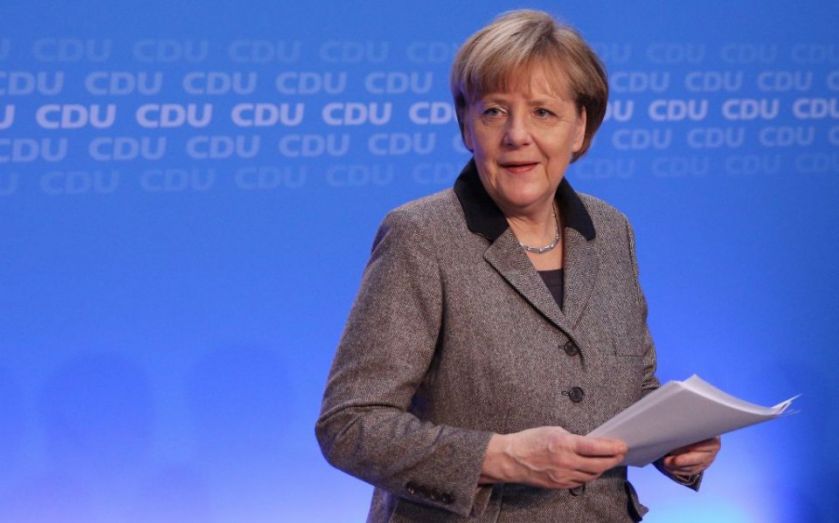Angela Merkel and Syriza are about to open Pandora’s box: Watch out, Eurozone

It is not often that I feel sorry for German Chancellor Angela Merkel. Having lived in her country since 2006, for me she is the most overrated of modern politicians, having accomplished almost nothing in terms of substantive policy achievements, while somehow being lionised for her lack of ambition. She is the archetype of this age in the West, the template for the over-valued mediocrities who have run the western world since the Lehman crash.
But for all that, I must admit that I pity her now. For on the immediate substance of the once and future Greek crisis, facts are on her side. From Berlin’s perspective, up until now, Greece has been given very generous terms in dealing with its economic calamity. Athens has been allowed more time to pay down its debt than was originally agreed. The interest payments themselves have been quietly largely discontinued, even though the interest rate has been set by the troika of the European Central Bank (ECB), IMF and EU at a benign 2.4 per cent.
Despite often grudgingly and haphazardly failing to wholly implement key agreed specifics of the reform package (tax collection, for instance, remains a shambles, there are far too many useless government workers still on the payroll, and labour market reform is far from finished) Merkel’s government has stuck by Greece’s bailout. And in return, in elections this month, Athens seems likely to elect Syriza’s Alexis Tsipras as Greek Prime Minister, a man who could not pass an introductory college course on economics anywhere in the world.
In terms of lunacy, the far left Syriza leader has real form. He has recently made a number of expensive campaign promises, at a cost of an additional €10bn, money his strapped country simply does not have and which international markets are highly unlikely to give him. Earlier this month, Tsipras forthrightly laid out his other-worldly agenda. “We are going to demand debt relief, and the money the Germans owe us from World War Two, including reparations [imagine how this sounds to Merkel], but we also want the (Elgin) marbles.” From such a statement, it is clear that Tsipras has lost his.
Yet if Tsipras is leading his country to economic ruin by telling his highly demoralised people what they want to hear rather than what is, the Greek firebrand is right about one big thing. Austerity for the sake of staying in the Eurozone has not helped the Greek people; Greek public debt remains at an astronomical 175 per cent of GDP. As the legendary financier George Soros put it last year, “everyone knows that (Greece) can never pay back its debt.”
What has happened is that Greek debt is now owned by European countries and continental and international institutions, while bankers have been allowed to cash out, despite making some very stupid loans to Athens. In essence, it’s German and French banks that have been saved by the bailouts, not the Greeks themselves.
Still, with Europe fortified through semi-banking union and ECB monetary backstops, and Tsipras hell-bent on escaping the shackles of austerity, a Eurozone divorce seems on the cards. Merkel fears giving in to him, as it would call into fundamental question the austerity and reform programmes she has prescribed for the debtor states, with France and Italy all too eager to demand that any improved terms made for Greece apply to all.
Likewise, in terms of domestic European politics, giving in to far-left Syriza would certainly strengthen economic illiterates in popular anti-euro parties like Italy’s Five-Star Movement, and Spain’s Podemos, the last thing Merkel desires. The euro itself hasn’t been particularly troubled by the crisis, with Italian and French bond yields holding steady. Surely, as some have reported, Merkel is right to think that now is the time to sever the weakest link.
All that is entirely true and yet I cannot help feeling that the German Chancellor and the rest of the EU establishment are yet again underestimating the scale of the continent-wide crisis, and the peril they are unleashing. After all, remember that US Treasury Secretary Hank Paulson let Lehman go under, also citing moral hazard and the fact that the world could sustain the crash of a fairly large US bank. To put it mildly, the Great Recession that followed made a lie of this argument. If Greece goes, the principle of the permanence of membership within the euro club is shattered; how long before there are attacks on more important weak links like France and Italy? Watch out everyone, for Pandora’s Box is about to be opened.
Dr John C Hulsman is senior columnist at City A.M. He is a life member of the Council on Foreign Relations, and author of Ethical Realism, The Godfather Doctrine, and Lawrence of Arabia, To Begin the World Over Again. He is president and co-founder of John C Hulsman Enterprises (www.john-hulsman.com), a global political risk consultancy, and available for corporate speaking and private briefings at www.chartwellspeakers.com